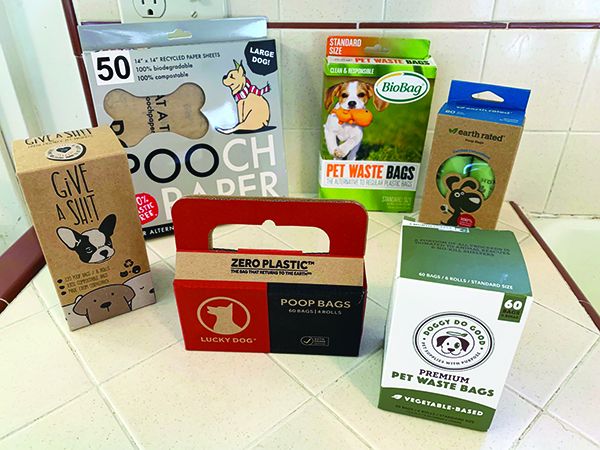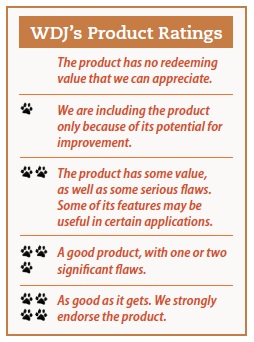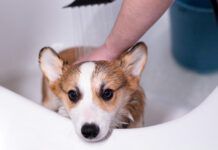As the saying goes, “Sh*t happens,” and as every responsible dog owner knows, cleaning up after their dogs is an absolute must. For those of us who try to be good stewards of the environment, biodegradable poop bags seem like a smart choice. Who wants to think of their dog’s poop festering away in a traditional polymer bag designed to survive a zombie apocalypse?
Unfortunately, the term “biodegradable” isn’t all it’s cracked up to be. When it comes to dog waste bags, Kermit the Frog was right: It’s not easy being green.
“Biodegradable” means “being of a substance or object capable of being decomposed by bacteria or other living organisms.” The definition offers no parameters as to how long it will take to achieve decomposition. Will a traditional polymer bag eventually degrade? Sure. But ecologists estimate it takes about 10 to 20 years in the environment and 1,000 years in a landfill.
“Landfills are built to exclude air, light, and water, so things that are in there will be there for a lifetime,” says Bob Borrows, a waste-policy analyst with the Oregon Department of Environmental Quality. Another problem? When traditional plastic bags degrade, they leave behind microplastics that contaminate the environment.
COMPOSTABLE DOG POOP BAGS
At this juncture, our recommended course of action is to buy compostable poop bags. “Compostable” is defined as being made of “organic matter able to be made into compost.” Today, many eco-minded manufacturers of pet waste bags offer a product line of compostable bags.
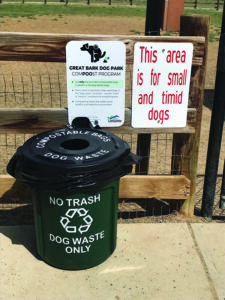
Most compostable pet waste bags are considered bioplastics; they look, feel and perform like plastic, but are typically made from renewable resources such as plant starch and are designed to breakdown via microbial activity. In a commercial composting facility, this can take about 90 days. If the bag is rated for home composting, the process can take 180 to 360 days, depending on climate and condition of the composting environment.
Further, we recommend looking for compostable bags that are ASTM D600 certified. ASTM is a voluntary standards organization, and D6400 certification ensures the product will successfully degrade in a way that will not negatively diminish the value or utility of the resulting compost.
That’s great news! But there’s some bad news: These plant-based bags are more expensive to produce than conventional plastic bags; your cost for fewer bags may be twice what you’d pay for plastic.
Moreover, while plant-based bags and poop are compostable, few commercial composting facilities in the United States accept pet waste – so you can’t just toss that bag of poo into the green yard trimmings bin with alacrity. And, while it’s not impossible, creating the ideal recipe for a high-temperature compost (needed to kill pathogens) at home can be challenging.
So why opt for the added expense and effort to source plant-based bags if they’re still likely to linger in a landfill?
Companies making the effort to produce waste bags that conform to compostability standards are, in general, striving to be earth-friendly in all facets of business. Using sustainable raw materials in a plant-based waste bag is still more eco-conscious than producing traditional polymer bags. Plus, it’s another small step we can all take to reduce our dependence on products made from fossil fuels.
OUR TOP PICKS FOR PLANT-BASED DOG WASTE BAGS
We selected five popular brands of plant-based dog waste bags that conformed to the ASTM D6400 standard. That standard looks at product compostability, including whether or not the degradation of the material may diminish the value or utility of the resulting compost.
Of the five brands, two (Doggy Do Good and Give A Sh!t) are also certified by TUV Austria (a European standards organization) for home composting.
Worth noting: It’s recommended that vegetable-based bags be kept in a cool, dry area and be used within a year of purchase.
All five brands feel durable. None of the bags tore improperly from the roll, all five were easy to open, and all withstood a reasonable amount of stretching and tugging.
In looking at our third-place bags, these products received a lower rating only because they failed to survive a pocketed trip through the washer and drier (a common occurrence for most dog owners!).
Also, in the case of the BioBag product, we marked it down for being substantially smaller, making it more difficult to flip the bag inside out to encase the mess without feeling like the mess was dangerously close to your hand. If you obsessively check your pockets on laundry day, or pick up after a small dog, these minor issues may not affect you.
RECOMMENDED COMPOSTABLE PET WASTE BAGS
| WDJ Rating | Product Name & Maker | Price | Size | Comments |
|---|---|---|---|---|
| 4 out of 4 Paws | Doggy Do Good Premium Pet Waste Bags doggydogood.com | $9.99 for 6 rolls of 10 bags on Amazon | 13.4” x 7” Folded; 13.4” x 11” with gussets expanded 20 microns thick | Unscented. ASTM D6400 Certified. These bags can handle a big load! Core made from recycled material. We like that they’re also available as handle bags on a roll and a dispenser box. Large enough to accommodate litter box cleaning and diaper disposal. Company donates to six different animal welfare organizations on a quarterly basis. Survived the laundry test! |
| 4 out of 4 Paws | Lucky Dog PoopBags luckydogpoopbags.com | $6.99 for 4 rolls of 15 bags on Amazon | 13” x 9” 17 microns thick | Unscented. Plenty big enough to “glove up” and handle the job. From an environmental standpoint, we like that Lucky Dog rolls don’t have a core, however, that does mean rolls won’t work as well in most traditional rolled-bag dispensers. We appreciate the detailed explanation of conditions needed for biodegradation. Company donates 1% of profits to environmental causes. Survived the laundry test! The lighter color does little to disguise the contents, and we wish the bags were also available as a boxed bulk roll. |
| 3 out of 4 Paws | Give a Sh*t Poop Bags giveasht.com | $12.99 for 8 rolls of 15 bags on Amazon | 12.5” x 9” 18 microns thick | Unscented. Nice large size. Packaging and core made from recycled material. We like that the company offers a plastic-free dispenser made of canvas that also has room for keys and treats. Bonus points for the punny company name and cute line drawings of dogs on the bags. Company donates 10% of profits to animal protection charities. Survived the laundry test! We do wish the bags were also available as a boxed bulk roll. |
| 2.5 out of 4 Paws | Earth Rated Compostable Poop Bags earthrated.com | $8 for 6 rolls of 10 bags on Amazon | 13” x 9” 20 microns thick | Available in unscented and lavender scented. Large size. Packaging and core made from recycled materials. Company makes both certified compostable bags and bags made from polyethylene with an additive said to accelerate degradation in a landfill environment “when the bag is exposed to anaerobic landfill conditions (heat, oxygen, agitation and moisture).” We find this claim confusing since, by definition, “anaerobic” means “without oxygen.” The Earth Rated poop bag did not survive the laundry test; it melted onto itself while pocketed in the drier, rendering it unusable. |
| 2.5 out of 4 Paws | Bio Bag Pet Waste Bags biobagpet.com | $4.99 for 50 bags on Amazon | 11.5” x 8” 23 microns thick | Unscented. The smallest of all the bags we tried. Company website says product is also available in a larger size, but it was difficult to find and considerably more expensive on Amazon. Most readily available as a 50-bag perforated-top flat pack. We appreciate that the company notes the bags are designed to be composted in a municipal/industrial facility and acknowledges that such a facility may not exist in the purchaser’s area. Packaging also refers users to findacomposter.com, to aid in the search for an appropriate facility. The Bio Bag did not survive the laundry test; it melted into itself while pocketed in the drier, rendering it useless. |
While traditional composting facilities in the United States aren’t jumping at the chance to add pet waste to their roster of acceptable feed streams, a handful of forward-thinking entrepreneurs and citizens’ groups are successfully implementing pet-waste composting programs to help reduce the carbon footprint of man’s best friend.
EnviroWagg in Aurora, Colorado, built an entire business out of composting dog feces, compostable bags and all, by partnering with a local residential dog-waste cleanup service and several area dog parks. The composted waste becomes Doggone Good Potting Soil, available online and in select Colorado retail locations. Owner Rose Seemann even wrote a related book, The Pet Poo Pocket Guide: How to Safely Compost and Recycle Pet Waste.
Similarly, a handful of dog parks and open space areas throughout the United States have started composting programs, including Marsha P. Johnson State Park (formerly East River State Park) in Brooklyn. Dog-owning park guests contribute to the enclosed pile using available scoopers or rapidly degradable paper waste bags. Sawdust is added to create the proper carbon-to-nitrogen ratio, and the compost pile is carefully attended to and monitored by park staff. The resulting fertilizer is used only on ornamental plants and flowers throughout the park, and, as an added precaution, away from children’s playground areas.
Canadians are even more ahead of the game, with some areas allowing pet waste contained in certified compostable bags in green bins meant for yard trimmings, and many professional poop-scooping services, such as Turd Wranglers of Chilliwick, BC, offer both scooping services and a stand-alone waste removal service for owners happy to scoop or bag-up pet waste themselves, but who wish to keep the “doody deeds” out of the landfill by paying to have the waste delivered to an appropriate facility.
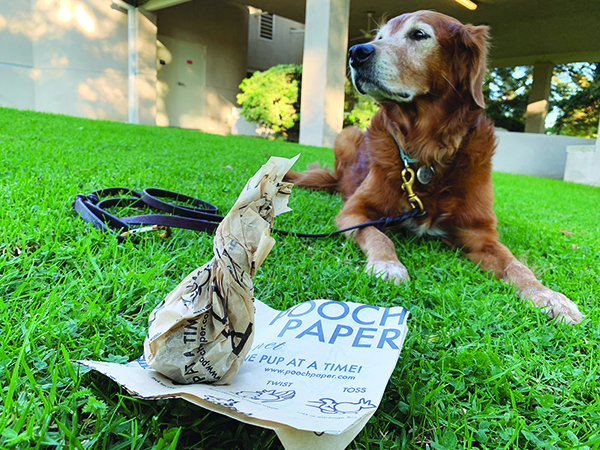
Ready to ditch pet waste bags all together? Enter Pooch Paper, a large sheet of recycled, non-chlorine-bleached, coated paper – sort of like wax paper. It’s strong enough to grab our test dog’s considerable-sized pile, but it required a little more focus to entrap the mess within the paper, which doesn’t conform to your hand as well as a pet waste bag. It was easier to use on dirt and very short grass. I struggled to grasp a mess in plush grass when individual “poo nuggets” separated from the pile and sank into the grass. It’s a bit like the dexterity one has wearing a glove versus wearing a mitten. Even though waste bags cover the hand like a mitten, they still allow for a trickier clean up. I’d trust Pooch Paper to a somewhat soft pile of poo, but anything resembling diarrhea would be a no-go.
Once the mess is contained in the paper, you just twist up the edges and carry it by the top of the bundle until you find an appropriate receptacle. With a twist of the wrist (versus a knot) being all that keeps the mess contained, I wouldn’t want to travel too far before pitching the poo.
Pooch Paper comes in a box of individually folded sheets. It would take some care to stash a few sheets in a pocket or the zippered “Pooch Pouch” leash attachment (sold separately). I’m not sold on Pooch Paper for a long outing with the potential for multiple poops along the way – but this could be a great alternative to bags for apartment dwelling dog owners on quick “potty runs” throughout the day. Pooch Paper’s main benefit? It’s really, truly, fully biodegradable and compostable. $13 for 50 small (12″ x12″) sheets or $13.50 for 50 large sheets (14″ x 14″) at poochpaper.com.
This got us thinking: If your pet’s pile can be easily contained in a 12″ sheet of paper, why not use unbleached compostable parchment paper, which can be torn to whatever length you desire? This could be a viable option for owners of small dogs with smaller “piles,” and, at just $3.50 for 45′, is very economical!


